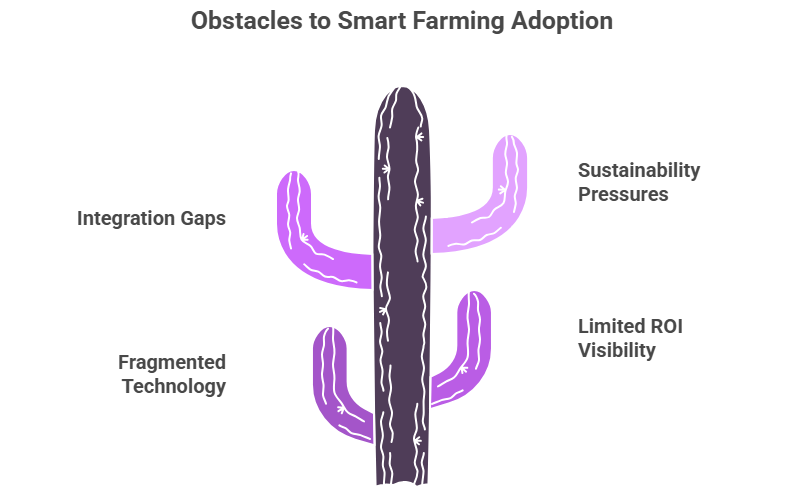The global agriculture industry is rapidly evolving as technology becomes central to productivity, sustainability, and profitability. From IoT-enabled soil sensors and satellite imagery to AI-based yield prediction and precision irrigation systems, smart farming platforms are transforming how the world grows food.
However, as innovation accelerates, agri-enterprises face a growing challenge of distinguishing between technologies that drive measurable outcomes and those that offer limited, short-term impact. With hundreds of new platforms entering the market each year, decision-makers struggle to evaluate scalability, interoperability, and ROI with clarity.
This is where technology benchmarking plays a pivotal role. By comparing the performance, reliability, and adoption success of smart farming solutions across global peers, agri-businesses can make data-backed decisions that optimize yield, reduce input costs, and enhance sustainability.
The Need for Performance Benchmarking in Smart Agriculture
As agriculture becomes increasingly data-driven, innovation alone is no longer enough it must be measurable, scalable, and reliable. Yet most agri-enterprises and cooperatives face a common challenge: they adopt emerging technologies such as AI-based analytics, automation, or IoT-enabled field devices without clearly understanding their comparative performance or real-world ROI.
Several key issues highlight why benchmarking is critical for the next phase of agri-tech evolution:

- Fragmented Technology Ecosystem: Farmers, agribusinesses, and governments are flooded with overlapping smart farming tools. Without standardized benchmarks, organizations struggle to identify which solutions genuinely enhance productivity or sustainability.
- Limited ROI Visibility: Many innovations promise efficiency gains but lack verifiable data on performance under different climatic, soil, and regional conditions. Benchmarking provides this missing layer of insight, enabling decision-makers to evaluate tools not on marketing claims, but on quantifiable field outcomes.
- Integration and Scalability Gaps: A growing number of agritech platforms are incompatible with legacy ERP, supply chain, or farm management systems. Performance benchmarking highlights interoperability strengths and weaknesses before large-scale deployment.
- Sustainability and Compliance Pressures: With global emphasis on sustainable farming and carbon-neutral operations, benchmarking helps measure how digital tools contribute to resource efficiency, emission reduction, and traceability, aligning innovation with ESG objectives.
Through structured benchmarking, Nexdigm helps agri-enterprises transform uncertainty into clarity, enabling them to focus on technologies that deliver measurable, repeatable, and scalable results across the entire agricultural value chain.
Nexdigm’s Smart Farming Technology Benchmarking Framework
True agricultural transformation requires evidence-based decision-making. Nexdigm’s Smart Farming Technology Benchmarking Framework enables agri-enterprises, cooperatives, and policymakers to evaluate digital solutions through a data-driven lens. The framework measures how technologies perform in real-world farming environments, guiding stakeholders toward investments that deliver measurable productivity, sustainability, and profitability gains.
By combining competitive intelligence, technology performance analytics, and sector-specific research, Nexdigm brings structure to the complex world of agricultural innovation.
Core Components of the Framework
- Global AgriTech Landscape & Innovation Mapping: Nexdigm analyzes global smart farming technologies, mapping their adoption trends, maturity levels, and performance benchmarks across regions.
- Performance and Capability Benchmarking: Platforms are evaluated on measurable parameters such as sensor accuracy, data latency, power efficiency, uptime reliability, and input optimization. This allows clients to identify technologies that deliver consistent results across crop types, geographies, and climatic conditions.
- ROI and Sustainability Impact Assessment: The framework integrates operational and environmental performance metrics, benchmarking yield improvements, input cost reduction, water efficiency, and carbon footprint across comparable implementations.
- Integration and Interoperability Analysis: Nexdigm assesses how well technologies integrate with existing farm management systems, ERP tools, and supply chain networks, ensuring that innovation enhances rather than disrupts operations.
- Strategic Roadmap and Investment Prioritization: Benchmarking insights are translated into clear, actionable strategies for technology adoption, vendor selection, and scalability planning, helping clients invest wisely and maximize long-term ROI.
Through this structured approach, Nexdigm empowers the agriculture sector to move from experimentation to transformation. By comparing technology performance across real-world deployments, we help stakeholders focus on what works, building a foundation for efficient, sustainable, and resilient smart farming ecosystems.
To take the next step, simply visit our Request a Consultation page and share your requirements with us.
Harsh Mittal
+91-8422857704

